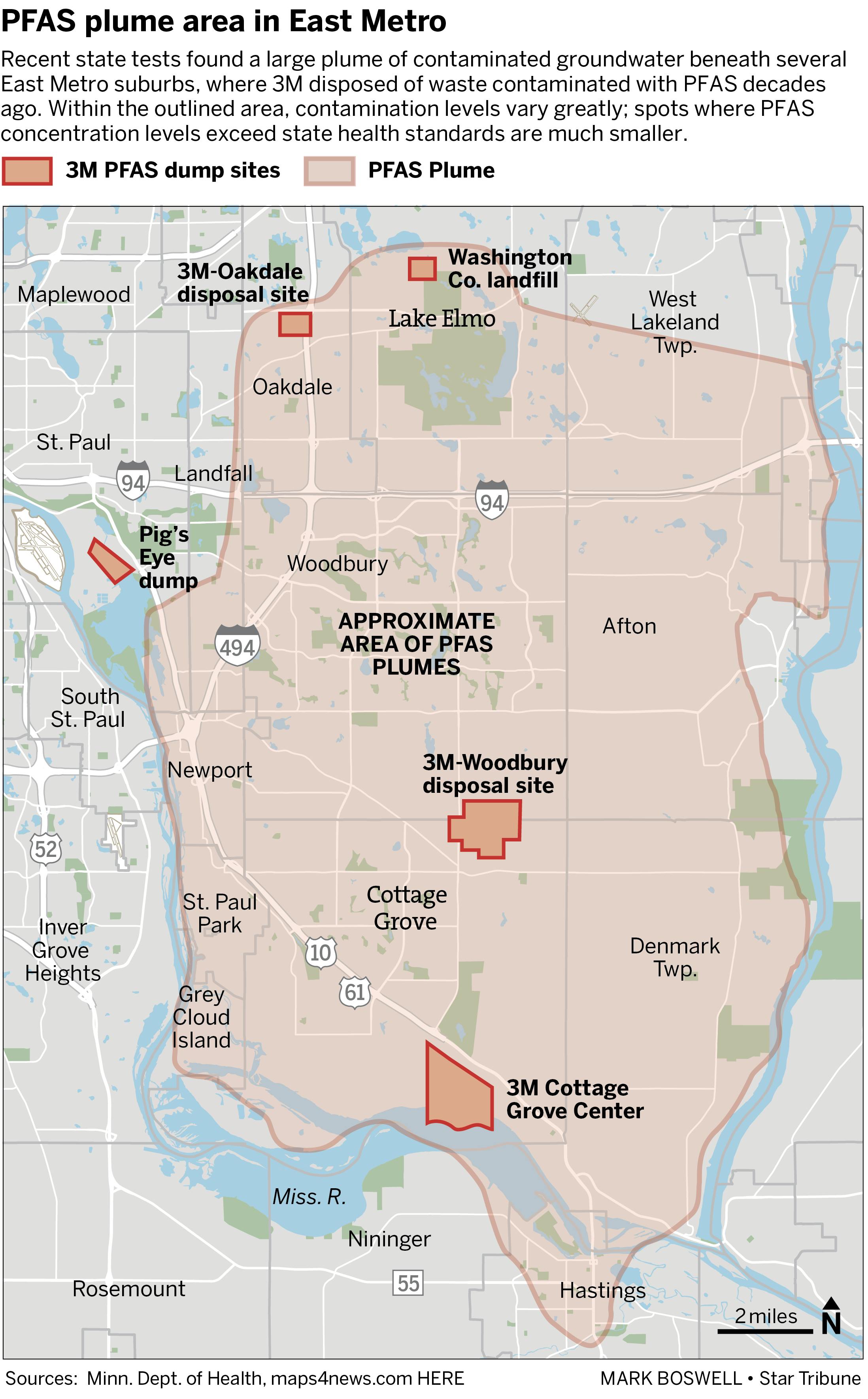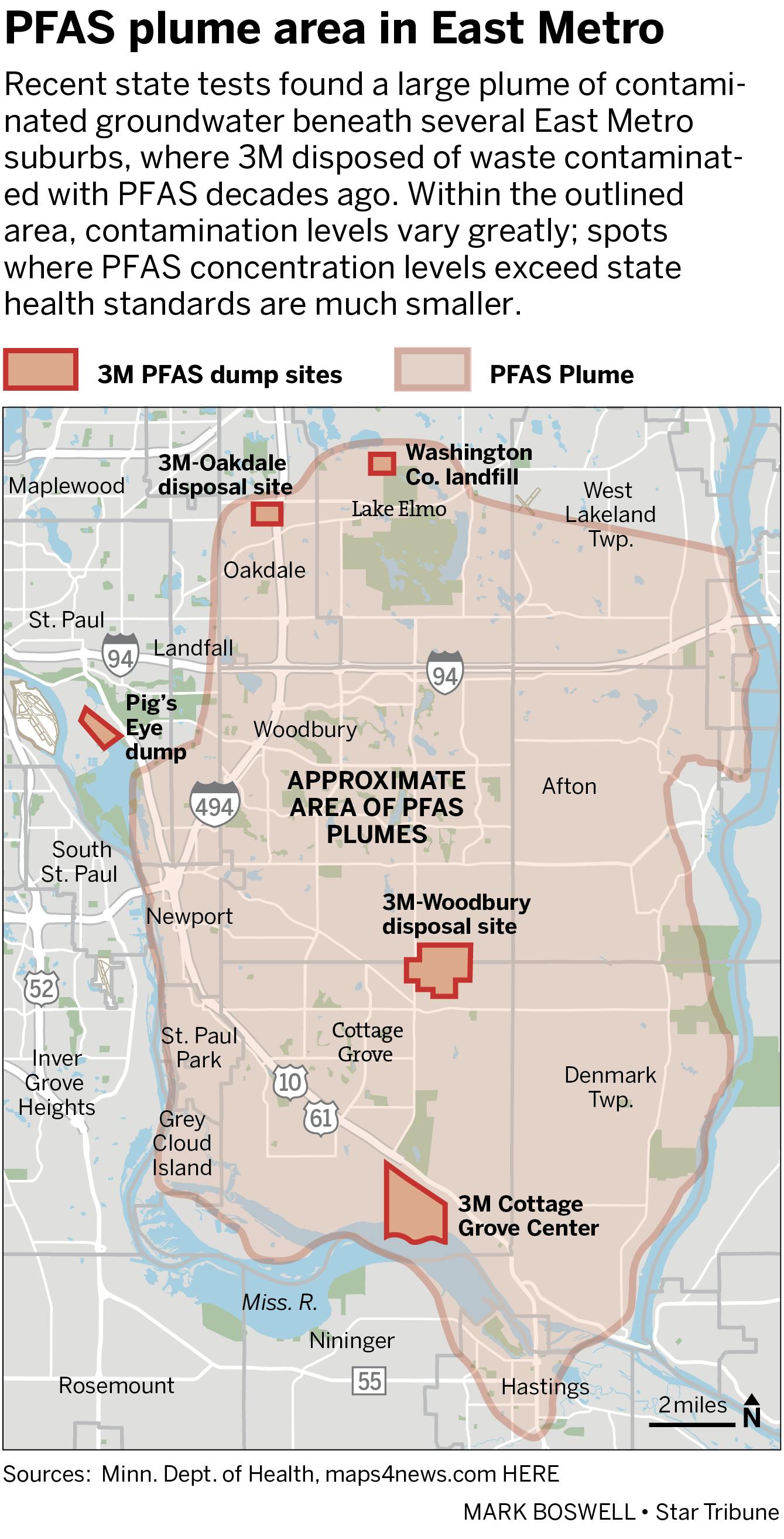Melissa DeWoskin will never know whether the toxic "forever chemicals" from her contaminated private well in West Lakeland Township played a role in her daughter's developmental disabilities.
The what-ifs and unknowns are difficult — and all the money from Minnesota's $850 million settlement with 3M Co. over the groundwater pollution from the man-made chemicals won't change that.
"Your instinct as a mother is to blame yourself," DeWoskin said, choking back tears. "Did I expose myself to something?"
The township is a hot spot for contamination from the man-made per- and polyfluoroalkyl substances called PFAS. The toxic nonstick chemicals, manufactured by Maplewood-based 3M, are linked to a host of diseases and don't break down in the environment. They've polluted more than 150 square miles of groundwater across southern Washington County, affecting the drinking water of 14 communities and more than 170,000 Minnesotans.


The scale of the problem is enormous, and state officials trying to divvy up the settlement face little consensus among cities, residents, environmental groups — and now 3M — over how to spend it. A sample of the more than 200 public comments on the three options the state issued last fall show myriad concerns such as costs being underestimated, priorities being misplaced and PFAS treatment levels not being strict enough.
In its 24-page letter to the Minnesota Pollution Control Agency (MPCA) and the state Department of Natural Resources, 3M Co. lawyers blasted the proposals for violating terms of the settlement. For example, the company said many of the drinking water projects under consideration are not "reasonable and necessary" projects, as the settlement requires.
The MPCA said the settlement clearly gives the state the sole authority to pick projects, and all three of the proposals fit the settlement's goals. 3M has no veto authority, said MPCA Assistant Commissioner Kirk Koudelka.
But it could take the state to court.
"Whether 3M selects to do so and attempts to delay the implementation of a future final decision on projects is up to them," Koudelka said. "We hope after our very public and inclusive process, which 3M is a part of, they do not decide to attempt to delay the implementation of projects."
3M issued a statement saying it "looks forward to continued engagement in this discussion."
Despite the discord, the state still aims to have a final plan in hand by late spring. Officials are now busy revising cost estimates upward and analyzing all the suggestions.
"The final decision isn't going to be a carbon copy of one of those three options," Koudelka said. "They are going to morph and change based on the feedback we're getting."
Water system overhaul
Getting PFAS out of the tap water in Washington County means building million-dollar treatment systems, shuttering private residential wells, constructing a vast network of pipes, installing more filters like the DeWoskins have, and much more.
"It's a logistical nightmare," said Jonathan Kalmuss-Katz, an attorney with the San Francisco-based environmental nonprofit Earthjustice who works on PFAS issues.
Nationally, concerns will arise again and again, he said, as the mass of PFAS litigation from coast to coast gets resolved. Everyone is trying to figure out how to safely remediate PFAS and get it out of the drinking water.
Two of Minnesota's options for Washington County are similar, involving different mixes of new public wells, public water treatment plants, new water mains and granular carbon-activated filters to homeowners, for example. The second option includes a stricter treatment standard for PFAS than the first option, which is the state's preferred choice, but both levels are stricter than the state's current safety guidelines for PFAS.
The third option would connect Oakdale and Lake Elmo to St. Paul Regional Water Services, switching their water source from groundwater to the Mississippi River.
For Lake Elmo, none of the options ensures it keeps its own municipal water system, said city administrator Kristina Handt. She said the city was caught off guard by a last-minute proposal to connect it to Woodbury's system.
"We really feel like we've had everything upended on us at the 11th hour," Handt said. "We are going to keep fighting for them until we can't fight anymore."
Woodbury, meanwhile, has requested multiple changes to the proposals. For example, it wants treatments for all existing municipal wells across the settlement area and wants treatment to the strictest possible health risk level.
"As water providers we have a responsibility to provide equitable water and service across all of our ratepayers," said Mary Hurliman, Woodbury's public works director. "We're still waiting for what the solution is."
Oakdale City Administrator Christina Volkers agreed, saying there are too many questions to pick an option: "We just need some answers."
Rural township's resistance
West Lakeland Township is a wooded community bordered by Interstate 94 to the south and the St. Croix River to the east. It's had a minimum lot size of 2½ acres since the 1970s and residents rely on private wells. It was hit hard by PFAS.
All the proposals call for building the township its first municipal water system and hooking up many homes. It's unclear how much that will increase local water bills. The state estimated that it costs about $500 a year to maintain a private well and that hooking up to a municipal system will double that, said Township Supervisor Marian Appelt.
"Right now we have nothing to go on for what the water costs would be," she said.
Many residents also dislike the idea that the state would likely require the contaminated private wells to be sealed, preventing their use for such things such as irrigating lawns. The concerns persist even though sprinkling contaminated water would spread PFAS again.
"I think that is a huge hurdle for support behind the municipal system," Appelt said. "If they were able to keep their private wells for irrigation purposes, I think there would be stronger support."
Appelt said that many other local residents, particularly younger families who are uneasy about the health effects of PFAS, have told her privately that they "can't wait for this to go through."
DeWoskin said she opposes the new municipal system as too destructive, and unnecessary since the carbon filters effectively screen out PFAS.
"I don't want them in the yard, digging it up," she said.
DeWoskin said she drank her well water throughout her pregnancy with Mckenna, learning only in 2018 that her well was contaminated — with one of the forever chemicals at levels more than double current health limits. Mckenna, now an outgoing 14-year-old who likes fast cars, Beethoven and horses, was diagnosed as an infant with developmental delays and then epilepsy, DeWoskin said. She will never be able to live on her own.
PFAS has been linked to a range of human health impacts, including changes in liver enzymes, reproductive problems, low infant birthweights and kidney and testicular cancer. Fetuses and babies are more vulnerable.
The jury is still out on whether PFAS causes neurological effects, according to Harvard University environmental epidemiologist Philippe Grandjean. Helen Goeden, senior toxicologist at the Minnesota Department of Health, said it's "very unlikely" PFAS exposure could have caused Mckenna's particular health issues. 3M has always insisted that PFAS doesn't harm people.
DeWoskin and her former husband, Mckenna's father, said they will always wonder.
"We don't know what the future holds," she said of Mckenna. "It's still difficult."
BREAKDOWN OF 3M PFAS FUNDS
Here's how the state is spending the $850 million settlement with 3M Co. over PFAS "forever chemicals":
$700 million for top projects to ensure a safe and sustainable drinking water supply.
$125 million for outside legal counsel, assessments and analysis.
$20 million for projects to restore and enhance natural resources.
$4.8 million to reimburse the state for the cost of providing filters, temporary drinking water treatment systems and natural resources assessments.
Jennifer Bjorhus • 612-673-4683
Biden administration moves to make conservation an equal to industry on US lands
Stock market today: Wall Street limps toward its longest weekly losing streak since September

